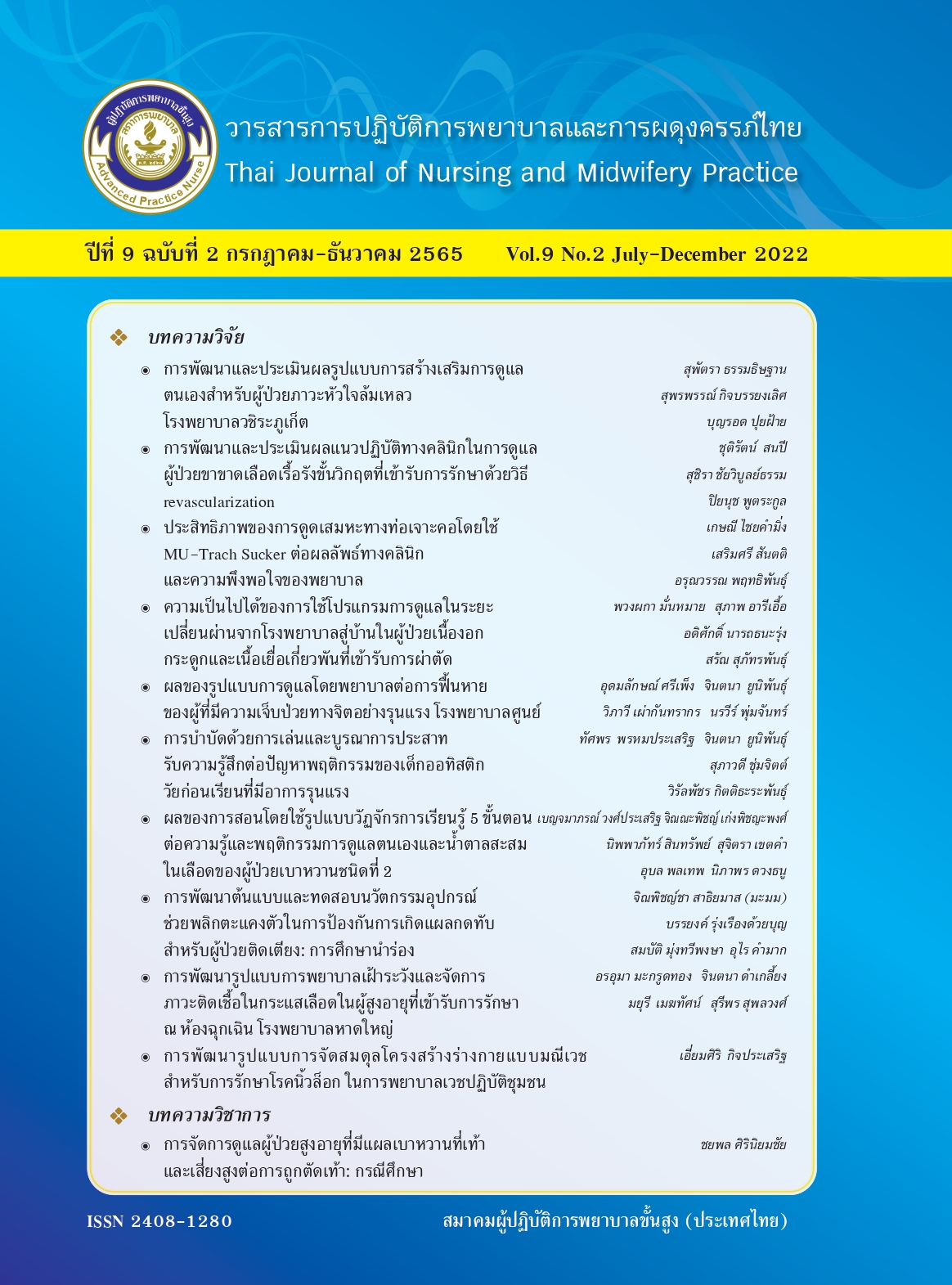The Effect of Teaching Using a 5Es Learning Cycle Model on Knowledge, Self-care behavior and Hemoglobin Levels among Type 2 Diabetes Patients
Main Article Content
Abstract
This research was a quasi-experimental design using one group with pre- and post-test. The aim was to explore the effect of teaching using a 5Es Learning Cycle Model on knowledge, self-care behavior, and hemoglobin A1c level among type 2 diabetic patients. The subjects were purposely sampled from patients with type 2 diabetes who have hemoglobin A1c levels more than 7 percent in diabetes clinics at Sunpasitthiprasong hospital between July 2020 to July 2021. There were 52 subjects who met the inclusion criteria. The intervention (education program) is based on the 5Es Learning Cycle Model, which consists of Engagement, Exploration, Explanation, Elaboration and Evaluation. The education program included teaching patients about self-care practices in different areas such as exercise, medication, injection insulin, healthy diet, foot examination, blood sugar monitoring and stress management. The subjects kept the log of their self-care practices on a calendar with certain target dates. The tools used for data collection include a personal data record form, a self-care report form (with a target calendar), hemoglobin A1c level, and a knowledge test. Descriptive statistics and Pair t-test was used in data analysis for comparison of knowledge scores before and after teaching. The results showed a statistically significant reduced hemoglobin A1c level after the intervention. Self-care behavior reflected in the target calendar showed 80.77% and 57.69% positive changes in diet and exercise, respectively. The study findings suggested that the education program based on the 5Es Learning Cycle Model could be used as a guide for nursing practice in order to control the hemoglobin A1c levels among type 2 diabetic patients.
Downloads
Article Details

This work is licensed under a Creative Commons Attribution-NonCommercial-NoDerivatives 4.0 International License.
References
Tangcharoensathien, V., Witthayapipopsakul, W., Panichkriangkrai, W., Patcharanarumol, W., & Mills, A. Health systems development in Thailand: a solid platform for successful implementation of universal health coverage. The Lancet 2018; 391(10126):1205-1223.
Aekplakorn, W., editors. Report of the 6th Thai people’s health survey by physical examination, 2019-2020. The Faculty of Medicine Ramathibodi Hospital. Mahidol University: the Graphic and Design Publishing House; 2021.
Aekplakorn, W., Chariyalertsak, S., Kessomboon, P., Assanangkornchai, S., Taneepanichskul, S., & Putwatana, P. Prevalence of diabetes and relationship with socioeconomic status in the Thai population: National health examination Survey, 2004–2014. J Diabetes Res 2018.
Sonne DP, Hemmingsen B. Comment on American diabetes association. Standards of medical care in diabetes—2017. Diabetes Care. 2017; 40(7): e92-e3.
Sukpitak Y. Empowerment technique for self-management of diabetes patients in accordance with the community life style- techniques to strengthen the patient's self-management. Diabetes in accordance with the way of the community. J Health Science 2014; 649-58. (In Thai)
Wagner EH. Chronic disease management: What will it take to improve care for chronic illness? Effective clinical practice. 1998; 1(1).
Wongprasert B. Annual quality fairs Sunpasitthiprasong Hospital Ubonratchatani. Proceedings of the quality fairs Sunpasitthiprasong Hospital UbonRatchatani; 2017 Aug 20-21; UbonRatchatani, Thailand; 2017. (In Thai)
Wongprasert B. et al. The development of learning process: A goal calendar for self-care recording of people with diabetic mellitus in Out-patient department of medicine nursing. J Environ Health & Community Health 2020; 5(2).
Norris, S. L., Engelgau, M. M., & Venkat Narayan, K. M. Effectiveness of self- management training in type 2 diabetes: a systematic review of randomized controlled trials. Diabetes Care 2001; 24(3):561-587.
Atkin JM, Karplus R. Discovery or invention? The Science Teacher. 1962; 29(5):45-51.
Müller U, Carpendale JI, Smith L. The Cambridge companion to Piaget: Cambridge University Press; 2009.
The Canadian Diabetes Association, 2018 [cited 2022 September 10]. Available from:http://guidelines.diabetes.ca/docs/patient-resources/goal-calendar.pdf
Marathe, P. H., Gao, H. X., & Close, K. L. American diabetes association standards of medical care in diabetes 2017.
Kalra, S., & Sahay, R. Diabetes fatigue syndrome. Diabetes Therapy 2018; 9(4):1421-1429.
Lin, E. H., Rutter, C. M., Katon, W., Heckbert, S. R., Ciechanowski, P., Oliver, M. M., ... & Von Korff, M. Depression and advanced complications of diabetes: a prospective cohort study. Diabetes care 2010; 33(2): 264-269.
Nam Phet Kham Kham. Comparison of the relationship between fasting and postprandial blood sugar levels and HbA1c levels in patients with type 2 diabetes mellitus. J the Primary care system & FAM Med 2021; 4(2), 50- 60. (In Thai)
Khammanee T. Pedagogical science, knowledge for effective learning process management. Bangkok: Chulalongkorn University; 2002.
Olson EA, McAuley E. Impact of a brief intervention on self-regulation, self-efficacy and physical activity in older adults with type 2 diabetes. J Behv Med 2015;38(6):886-98.
Addo B, Sencherey S, Babayara MN. Medication noncompliance among patients with chronic diseases attending a primary health facility in a Periurban district in Ghana. Inter J Chronic Disease 2018;2018.
Katon W, Russo J, Lin EH, Schmittdiel J, Ciechanowski P, Ludman E, et al. Cost-effectiveness of a multicondition collaborative care intervention: a randomized controlled trial. Archives of general psychiatry2012;69(5):506-14.
Oftedal B, Karlsen B, Bru E. Perceived support from healthcare practitioners among adults with type 2 diabetes. J Adv Nursing2010;66(7):1500-9.
Si D, Bailie R, Weeramanthri T. Effectiveness of Chronic Care Model-oriented interventions to improve quality of diabetes care: a systematic review. Primary Health Care Research & Development. 2008;9.
Keeratiyutwong PH, Hanucharoenkul S. Long-term monitoring of the effectiveness of self-care programs in People with type 2 diabetes. Rama Nurs J2013;16(2):293-308. (In Thai)
Funnell MM, Anderson RM. Empowerment and self-management of diabetes. Clinical diabetes. 2004;22(3):123-7.


